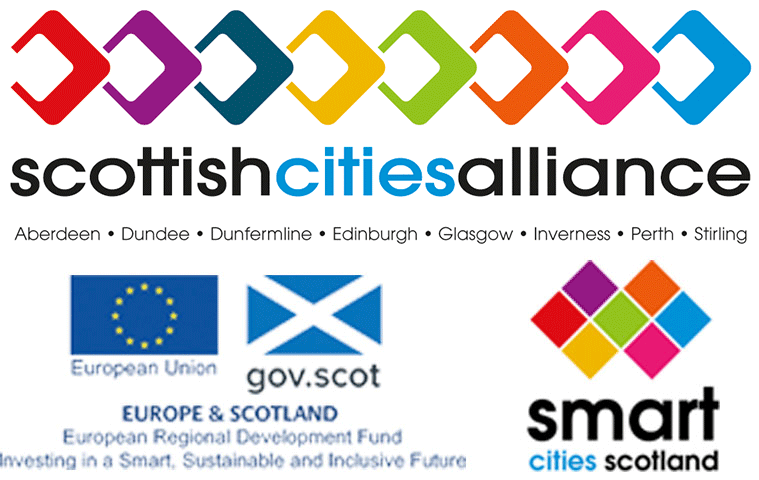
Project Overview
This Smart Infrastructure Water Management project has enabled the development of Smart systems to manage in real time the water level of the Glasgow branch of the Forth & Clyde Canal – including responding to weather conditions and storm forecasts. This component forms part of the North Glasgow Integrated Water Management System (NGIWMS) programme, now branded as Glasgow’s Smart Canal, to provide the surface water drainage solution for the regeneration of multiple vacant and derelict land sites in North Glasgow via a series of Water Management Areas (WMAs).
Why is it needed?
In its successful bid to be one of the Rockefeller 100 Resilient Cities across the world, Glasgow chose to focus on its plans for climate change resilience. This especially relates to increased rainfall and flooding, which are predicted local outcomes of global warming for the city-region.
Historically, a significant area of North Glasgow has been at risk of surface water flooding, limiting development potential across the area and creating substantial amounts of vacant and derelict land. With local sewer systems at capacity, no natural watercourse in the area and climate change likely to increase the frequency and intensity of adverse weather events, a different approach to removing excess surface water was required.
After a decade of planning, the solution has been the Glasgow ‘Smart Canal’ Scheme, relying on sensors and predictive weather technology to dynamically manage water levels along the Forth & Clyde Canal allowing it to become a drainage route for excess surface water during high rainfall events. With early warning of wet weather, the water level in the canal can be lowered by up to 100 mm, isolating the North Glasgow section and moving excess water into the nearby River Kelvin.
Impact and Benefits
The Institution of Civil Engineers (ICE) State of the nation Report 2020 notes that the Glasgow ‘Smart Canal’ Scheme creates 55,000 cubic metres of extra capacity that can absorb the anticipated rainfall and surface water runoff – the equivalent of 22 Olympic swimming pools. The alternative, traditionally engineered, solution would have been to create a 2km tunnel connecting the area’s drains with the River Clyde and would cost around £45 million
Instead, the preferred approach has involved a £17 million investment in the Smart Canal Scheme delivered through a 60-year partnership between Glasgow City Council, Scottish Canals and Scottish Water. Officially named the North Glasgow Integrated Water Management System, it is a sustainable solution that has received capital funds from Glasgow City Region City Deal, and grants via ‘Scotland’s 8th City – the Smart City’ and the Green Infrastructure Fund (both European Regional Development Fund programmes).
Crucially, it has unlocked 110 hectares of previously unusable land across North Glasgow for development and regeneration: around 3,000 new energy efficient homes, a school and other developments are being built in communities close to canal – include many neighbourhoods within the Scottish Index of Multiple Deprivation (SIMD) 10% most deprived datazones.
It is also boosting biodiversity at sites along its length, improving green connections to surrounding areas and opening up green and blue spaces for recreation. Importantly, it is creating a new, pedestrian-friendly community and, with the inclusion of active travel routes, it will improve the area’s connectivity to the nearby city centre.
The Scheme has attracted interest from other local authorities and international visitors who are rethinking how they can use their reservoirs and canal networks.
At the Smart Canal launch event, Catherine Topley, CEO at Scottish Canals, said:
“By unlocking the inherent value of Glasgow’s Canal and diversifying how we use this publicly-owned heritage asset, we are ensuring it continues to deliver for local people 250 years after it was first built. Creating a dynamic urban canal which uses smart technology to move water safely about the city will not only reduce the flood risk impact of climate change, but act as a catalyst for new investment, jobs, homes and businesses in North Glasgow as well as help to create one of the city’s top tourist destinations.”
In 2021/22 the project received six major awards in relation to innovation, regeneration and infrastructure development. The Smart Canal has attracted interest from other local authorities and international visitors who are rethinking how they can use their reservoirs and canal networks. In November 2022 the project was selected by the Institution of Civil Engineers as one of three global exemplars of sustainable development – alongside projects in Peru and India.
For more information contact David Hay, Group Manager – Engineering, DRS, Glasgow City Council – david.hay@glasgow.gov.uk

 X
X Linkedin
Linkedin